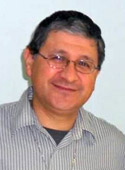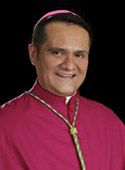
A Brief Summary on the Collegeville National Symposium on Lay Ecclesial Ministry
FIP President's Note:
By Reynaldo Montemayor Jr. PhL.
President of the FIP
Director of Pastoral Institute - Diocese of Laredo (TX)
 September 21, 2011
September 21, 2011
FIP’s recent participation at the Collegeville National Symposium on Lay Ecclesial Ministry made manifest its leadership since many Hispanic leaders present at the symposium were and/or still are FIP members! We met old friends and made new friends at the symposium, and we hope to see them again at our annual FIP meeting in January 2012! And thanks to their leadership and faith in our organization, FIP was named and called upon for about 5 of the 86 proposed recommendations towards the end of the symposium, and though none came up as one of the final 5 recommendations, FIP may be implied in 2 of them that mention “the need for further dialogue with representatives from culturally diverse groups about the cultural implications impacting lay ecclesial ministry formation, certification, and authorization” and “a need for cultural sensitivity within the certification process”.
The FIP Board met at Collegeville previous to the symposium for its yearly strategic planning meeting. The report for this meeting will be posted soon. Its highlights: the new FIP manual will now be entering the translation and editing-for-publishing stage; the final edition on pending by-law revisions on FIPs vision, mission and fundamental goals; and the elaboration of most of the agenda and program for FIP’s Annual General Meeting in Joliet Jan. 16-19, 2012. Our annual meeting will highlight FIPs active response to the Collegeville National Symposium on Lay Ecclesial Ministry, the Emerging Hispanic Catholic Leadership Initiative and a special workshop for our own professional and organizational advancement.
During the symposium we considered, reflected and discussed the ideas posited by 7 different theologians on a script titled “In the Name of the Church: Vocation and Authorization of Lay Ecclesial Ministry”. After much discussion and putting many of the theologians up to the test and against pastoral realities and issues posed by many of us, a symposium majority supported and voted to endorse the 8 final theological points of convergence on lay ecclesial ministry.
My biblical icons for lay ecclesial ministry are Sts. Aquila and Priscilla (Acts 18, 1-4, 11, 18-19, 24-26. 1Cor 16,19. 2Tim 4,19. Rm 16,3-5), and my post symposium definition of lay ecclesial ministry is: a vocation within the baptismal and chrismal (Confirmation) vocation to participate in Christ’s prophetic, priestly and kingly mission, but also authorized by a bishop or a delegate to collaborate more closely with and under the ordained ministry in the name of the Church and in a particular way in ministry. The Theological Points of Convergence (TPC) endorsed by the majority still may need more precise language. TPC 5 says: “Lay ecclesial ministers serve in the name of the Church”, and this seems to be charged with the notion of “authorization”, since TPC 6 says: “The bishop or his delegate authorizes the lay ecclesial minister for ministry in the name of the Church.” And so, “in the name Church” seems to imply primarily “in the name of the bishop” or the “hierarchy” because TPC 4 says that Lay ecclesial ministry is characterized by “the authorization of the hierarchy”. We can include the community in the term “Church”, but never in opposition to, but in communion with, the bishop/hierarchy. If Cardinal George commented he had issues with the notion of “authorization” in this conversation, we can anticipate discussion around the vague terms in the TPCs. Further discussion may be about the specifics or limits in authorization, and if “acceptance”, “recognition” or “approval” by the bishop/hierarchy is equivalent to authorization. I wonder what the effects on Hispanic lay ecclesial ministry or ministers would be, if we restrict or amplify the notion of authorization “in the name of the Church”. It is worth pondering about in a symposium of its own. What do you think? Come to our annual meeting in Joliet and let’s talk!
 “The New Evangelization impels us to continue joyfully responding to the Spirit that never ceases to stimulate our communities to a deep conversion. Our call to celebrate the Gospel and to proclaim it to all our communities is at the very core of the creative ministry of the FIP. With years of Hispanic experience the Federation will continue to respond to the challenges of today’s world and will continue to serve by offering excellent faith, academic, and ministerial formation to our communities and beyond.”
“The New Evangelization impels us to continue joyfully responding to the Spirit that never ceases to stimulate our communities to a deep conversion. Our call to celebrate the Gospel and to proclaim it to all our communities is at the very core of the creative ministry of the FIP. With years of Hispanic experience the Federation will continue to respond to the challenges of today’s world and will continue to serve by offering excellent faith, academic, and ministerial formation to our communities and beyond.”